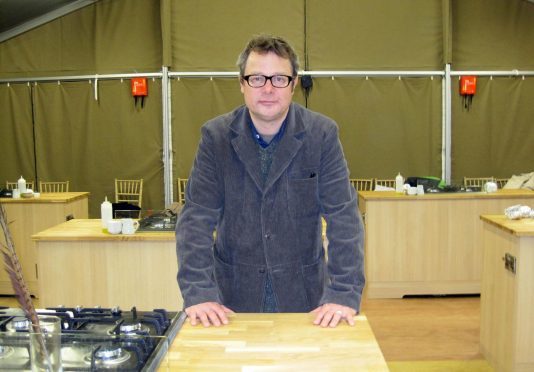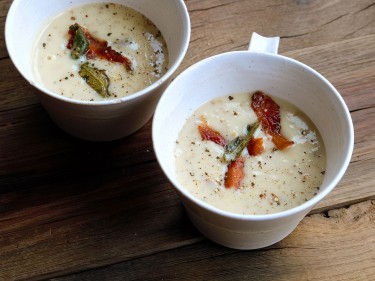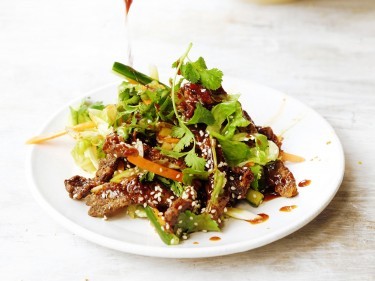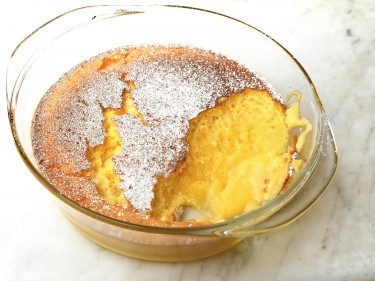Next time you scrape leftover food into the bin, you’re going to hear Hugh Fearnley-Whittingstall in your head, asking whether or not you could have transformed those scraggly bits into something delicious. He tells us about his mission to end food waste, with a very inventive new cookbook
“I haven’t got any recipes for completely mouldy lemons that have gone blue, but if it’s mouldy at one end, then I’ll cut that end off and use the other half,” says Hugh Fearnley-Whittingstall, being quite serious.
This is, after all, a man who was once nicknamed “Hugh Fearlessly-Eatsitall”, and his latest book, Love Your Leftovers, sets out to get everyone else doing the same.
The 50-year-old celebrity chef, famed for his River Cottage series and books, is horrified at the amount of food and leftovers we chuck in the bin, and sees odds and ends as “a really legitimate source of ingredients”.
“More than half the meals I put together incorporate something from a previous meal, or something that’s knocking around or needs eating up, that’s wagging its finger at me saying, ’If you don’t eat me soon I’ll be on the compost’.
“This is something that’s very ingrained in me, but talking to others, it’s something people don’t always have a lot of confidence around,” he says, explaining the drive behind the book.
“There’s a lot we can do to get the best out of our ingredients, throw less away, to save money and address what is amounting to a major environmental problem, and we can all do our bit. But it doesn’t have to be done out of a sense of guilty conscience, it can be done with a great sense of joy and excitement, because – here’s the real crux of it – I’ve always found the dishes I spin out of leftovers to be the most satisfying and delicious.”
From salvaged greens and leftover lamb transformed into a Shepherd’s pie, the Old Etonian does also include recipes for crispy fish skeletons (which he admits is going “out on a limb“) and potato peel soup.
“You can actually spin a really original and delicious little snack from a mackerel skeleton and a little bit of spice from the cupboard,” he buzzes, adding: “And potato peel soup is an absolute revelation!”
Apparently it tastes like the liquidised skin of a baked potato, packed with “an earthy, almost mushroomy, umami flavour”.
Fearnley-Whittingstall’s obsession with leftovers is just one of the many strands of food waste he abhors.
In 2010, his Fish Fight campaign successfully fought “crazy EU laws” that allowed 50% of caught, edible fish to be thrown back overboard, dead, and now he’s getting on the case of ordinary shoppers and supermarkets.
“Between a quarter and a third of the food we produce is thrown away, and we bear responsibility for about half of that at home,” he explains, while the other half is the responsibility of the big retailers.
“It’s to do with their incredibly strict cosmetic standards and big piles of food accumulating at the farms, not because the farmers want to throw it away, but because the supermarket said, ’That carrot’s not straight enough’.”
His recent BBC series, Hugh’s War On Waste, set out to challenge people and companies to radically reduce the amount of food waste they produce.
“Food waste is a solvable problem. We just need to be a bit smart about how we address that, and if we’re going to demand that of the supermarkets – and I think we should – we also have to be ready to do our bit.”
Being based in Devon, his family rarely gets takeout (unless it’s from “an incredibly good pizza place in Honiton” that does “delicious sourdough“), but Fearnley-Whittingstall himself is keen on keeping up with foodie street markets (“It’s interesting how street food is really becoming so diverse and exciting“).
Regardless of the options available, for this foodie, organic, home-grown produce will always be his ideal.
“Even if I’ve been cooking to camera all day,” he explains, “when I get home, for me, the way to relax is still to see what’s in the fridge, grab a couple of things from the garden and improvise the meal – albeit with a glass of wine in my hand.”
If your fridge is overflowing with odds and ends, before chucking them in the bin, have a go at one of these three recipes from Fearnley-Whittingstall’s new book…
:: POTATO PEEL SOUP
(Serves 4)
20g butter, or rapeseed or sunflower oil
1 large or 2 medium onions, diced
1 bay leaf
About 200g potato peelings (about as much as you’d get from preparing a decent-sized tray of roast potatoes)
500ml whole milk
500ml chicken or vegetable stock
2tbsp finely chopped parsley leaves (optional)
Salt and freshly ground black pepper
To finish (optional):
Fried sage leaves
Crisp-grilled bacon
Heat the butter or oil in a medium saucepan over a medium-low heat and add the onions, bay leaf and a good pinch of salt. Saute gently, until the onions are soft but haven’t taken on much colour, about 10 minutes.
Add the potato peelings and give everything a very good stir for a minute.
Pour in the milk and stock, season well with salt and pepper and bring to the boil. Reduce the heat and simmer gently until the peels are very tender – another 10 minutes or so.
Remove from the heat and cool slightly, then puree in a food processor, blender or using a stick blender until very smooth.
Return the soup to the pan and reheat gently. Season well with salt and pepper and stir in the chopped parsley, if using.
Serve in warmed bowls, topped with fried sage leaves and shards of crisp-grilled bacon, if you like. Finish with a generous grind of pepper.
:: CHINESE-STYLE SPICY CRISPY BEEF
(Serves 4)
250-400g roast beef, the rarer the better
Vegetable or groundnut oil, for frying
3tbsp cornflour
1tsp Chinese five-spice powder (optional)
A little very finely grated orange zest
Pinch of flaky sea salt
For the sauce:
3tbsp sweet chilli sauce
2tbsp soy sauce
1 garlic clove, grated
1/4tsp finely grated ginger
Juice of 1/2 an orange
For the salad:
A few crisp lettuce leaves, such as romaine (or even the much-maligned iceberg), finely shredded
1 carrot, julienned or grated
1/2 small cucumber, seeds scooped out, then cut into thin batons
3 spring onions, trimmed and finely sliced, slightly on the bias
1tbsp rice wine vinegar
To finish:
Handful of sesame seeds, lightly toasted if preferred
Sprigs of coriander (optional)
First make the sauce. Put all the ingredients into a small pan, simmer for a couple of minutes until thickened, then set aside.
Cut the beef into strips, 3-4mm thick. Heat a 2-3cm depth of oil in a wok or a deep saucepan – the fat will bubble up when you add the beef, so don’t use a shallow pan. Heat the oil to 180C, or until a cube of dry white bread dropped in turns golden in just under a minute.
Sift the cornflour and five-spice powder, if using, onto a plate. Toss the beef strips in the cornflour until well coated on all sides.
Fry the beef in a couple of batches to avoid crowding the pan. Lower into the hot oil and fry until golden and crisp, which should only take a couple of minutes. Scoop out with a slotted spoon and place on kitchen paper to drain. Let the oil come back up to temperature before adding the second batch of meat to the pan.
Mix the orange zest with the flaky sea salt and sprinkle over the beef.
For the salad, toss the vegetables together with the rice wine vinegar.
Pile the salad and crispy beef onto individual plates. Trickle on the sauce and add a scattering of sesame seeds. Garnish with coriander if you have some to hand.
:: LEMON AND YOGHURT PUDDING CAKE
(Serves 6)
40g butter, melted and cooled, plus extra to grease the dish
160g caster sugar
3 large eggs, separated
Zest and juice of 2 unwaxed lemons
3tbsp self-raising flour
1/2tsp baking powder
250g thick Greek-style or other natural wholemilk yoghurt (less than fresh is fine)
To finish:
Icing sugar
Preheat the oven to 180C/Gas 4. Lightly butter a 1.5L ovenproof dish.
Using an electric hand mixer, or free-standing mixer, beat together the butter and sugar until light, pale and fluffy, about five minutes, scraping the bowl down with a spatula.
Beat in the egg yolks and lemon zest, then sift the flour and baking powder together over the batter and lightly fold in.
Whisk together the yoghurt and lemon juice, then gently stir this mixture into the batter, until just combined.
Whisk the egg whites in a scrupulously clean bowl until they form soft peaks, then gently fold into the lemon mixture, using a metal spoon.
Spoon the mixture into the prepared dish. Stand the dish in a roasting tin and carefully pour in boiling water from the kettle to come halfway up the sides of the dish. Bake for about 50 minutes until the pudding is puffed up and lightly golden on the top – it should still have a slightly tender wobble to it.
Carefully remove from the oven, then lift the pudding out of the roasting tin. Leave to stand for five minutes before serving.
Dust with icing sugar to serve. Hand round a jug of double cream or a bowl of thick fresh yoghurt for everyone to help themselves.
:: River Cottage Love Your Leftovers by Hugh Fearnley-Whittingstall, Photography by Simon Wheeler, is published in hardback by Bloomsbury, priced £20. Available December 3
Hugh’s War On Waste was broadcast on BBC One and is available on iPlayer



